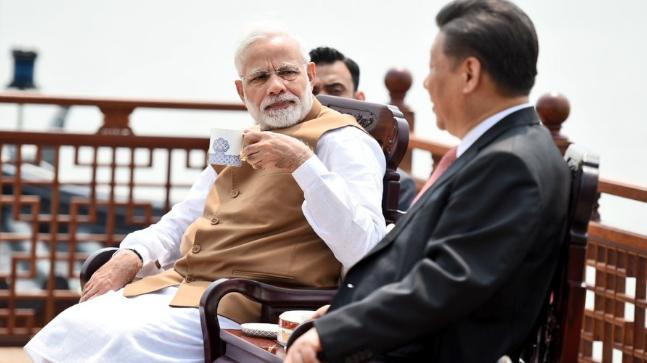India refused to endorse the One Belt One Road (OBOR) initiative by China at the end of the two-day summit of Shanghai Cooperation Organization (SCO). The SCO is a political, economic and security organization of eight countries neighboring China. The countries Russia, Pakistan, Kazakhstan, Uzbekistan, Kyrgyzstan and Tajikistan released a declaration “reaffirming their support for the Belt and Road Initiative (BRI)” at the end of the summit. Indian PM Modi in his address to SCO said “Connectivity with the neighboring countries is India’s priority. We welcome the connectivity projects which are sustainable and efficient and which respect territorial integrity and sovereignty of the countries,” Chinese President Xi Jinping was present there during his speech. PM Modi registered concerns of India regarding China Pakistan Economic Corridor (CPEC) which passes through Pakistan Occupied Kashmir (PoK) through his address.
The OBOR initiative was unveiled in 2013 a few months after Chinese president Xi Jinping took over from his predecessor, Hu Jintao. OBOR is considered a major part of Xi Jinping’s domestic agenda and foreign policy. OBOR initiative represents by far China’s most ambitious project to connect the country with Africa, Central and Southeast Asia, Europe, and the Middle East through transportation infrastructure. OBOR’s two main components, the Silk Road Economic Belt and the Maritime Silk Road, comprise a multi-trillion-dollar plan spanning 68 countries, which represent 60 percent of the global population and up to 40 percent of global GDP. The idea of overland Silk Road comes from Han dynasty which developed an ancient silk road to trade with Central Asia and Mediterranean basin in second century BC. The idea of maritime Silk Road also goes back to the fifteenth century when maritime expeditions of Admiral Zheng connected Ming-dynasty China to the littoral states of the Indian Ocean. Although, despite these two ancient routes for overland and maritime trading most of the Chinese trade has been limited to its Eastern and southern neighbors for most of its recent history. The OBOR plan is an attempt by Xi Jinping to revive these two ancient trading routes.
The OBOR’s stated goal is to develop infrastructure for poorly connected regions of the world but hidden agenda behind this ambitious plan is to lay the groundwork for a Sino centric global order. China wants to economically colonize the poor countries in Central, South and Southeast Asia through this ambitious project. This project could be compared to Marshall Plan which United States announced for infrastructure building in post World War II Europe. The unstated goal of Marshall Plan was to stop countries in Europe from joining the Soviet Union and pressure them to join NATO by building ports, pipelines, roads, and railways for them. Similarly, China by building ports, economic zones, railways for poor countries like Pakistan wants to bring them under its hegemony. This plan would also help the country economically because it will save China from the economic decline that it’s slowing growth rate and high debt levels seem to portend. The Chinese economy is slowing down after almost three decades of unhindered growth which made China second largest economy in the world. This infrastructure initiative, according to China’s leaders, would create new markets for its companies and at the same time provide a shot in the arm to the struggling banks and state-owned enterprises. The nationalized companies of China are posting negative growth since last few years and its banks are struggling because the lending activity has slowed down significantly. China has foreign reserves of more than three trillion (This is one and a half times of India’s GDP for this fiscal year) and through this project, the country will invest this forex throughout the world.
The SCO summit released a statement which reads “The Member States express appreciation for the joint efforts taken towards its implementation, including efforts to coordinate the development of the Eurasian Economic Union and the BRI and call for using the potential of the regional countries, international organizations and multilateral associations to create a broad, open, mutually beneficial and equal partnership in the SCO space.” China lured these SCO members with heavy investment, this is the reason these countries supported OBOR. Many countries are now realizing that OBOR is a trap of China, Sri Lanka recently had to hand over the strategic port of Hambantota to Chinese government because they could not pay the debt. China will follow the same strategy in other poor countries when they will not be able to pay the debt of infrastructure project Chinese government will take over it. This is a strategy by China for economic colonization of Asia and built a Sino-centric global order.

























